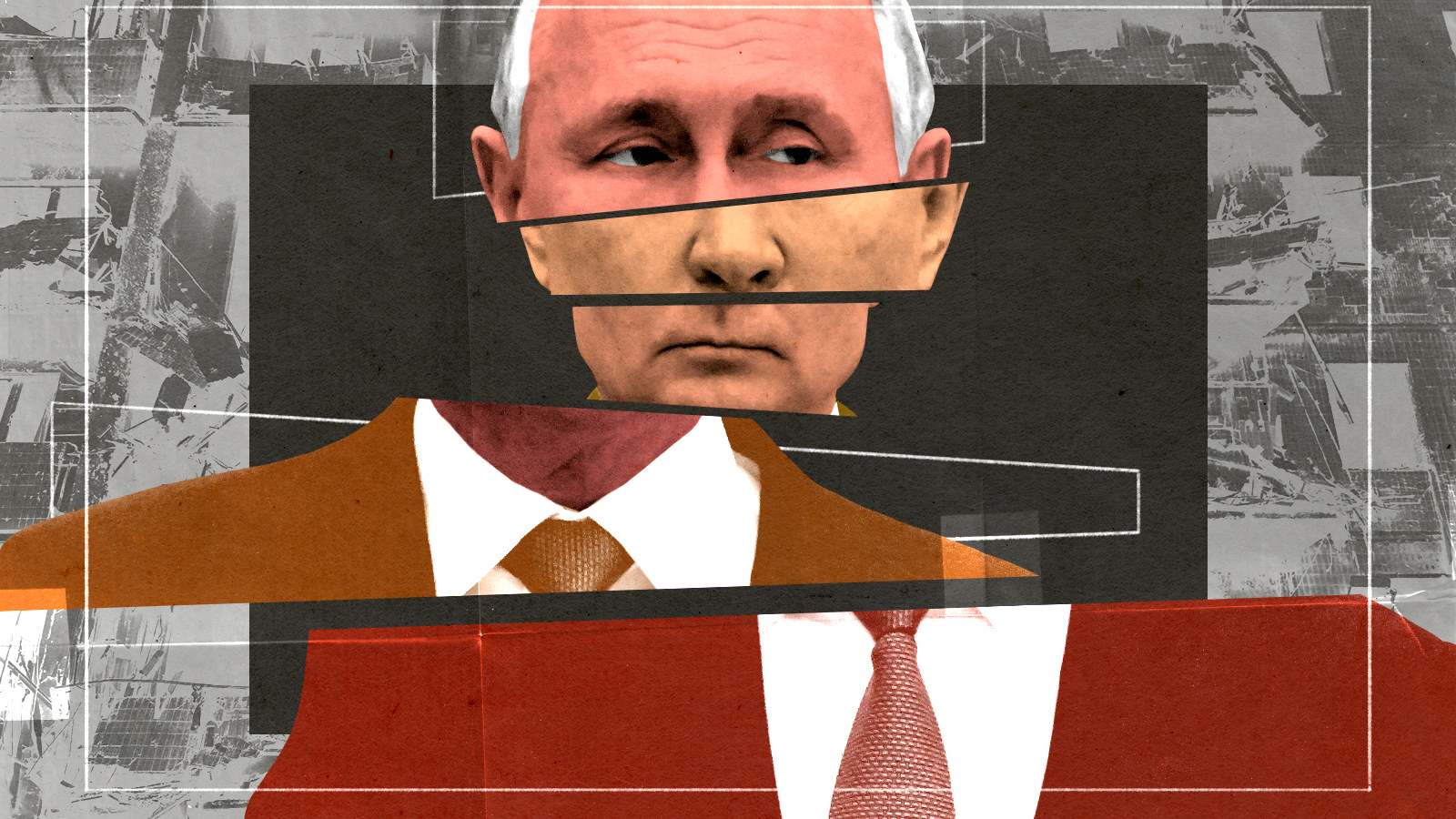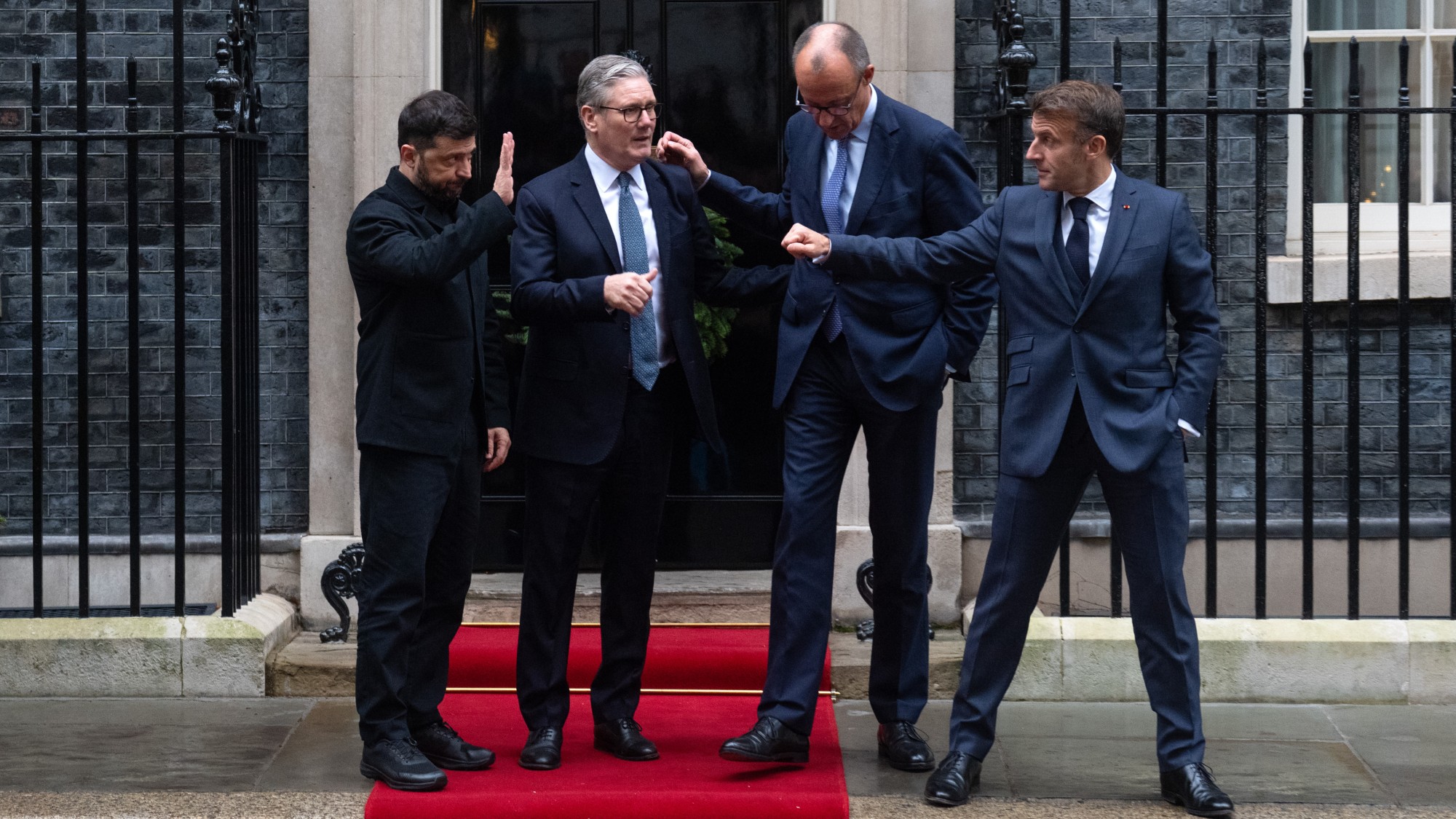We've all agreed Putin is wrong. Now what?
What comes next in the West's standoff with Russia over Ukraine?


A free daily email with the biggest news stories of the day – and the best features from TheWeek.com
You are now subscribed
Your newsletter sign-up was successful
How fast have events been moving over the past several days? So fast that my initial take on Russia's invasion of Ukraine, written Thursday morning, just hours after the war began, is already irrelevant.
Then, I mainly expressed sadness at what I expected to be Ukraine's swift and decisive defeat at the hands of Russia's vastly more powerful military machine. Instead, that machine has sputtered, and Ukraine's unexpected resolve has inspired what can only be described as geopolitical earthquakes.
Germany's government has sharply hiked spending on defense, breaking from decades of precedent. The European Union has shut down its airspace to commercial and private Russian airplanes and committed, along with several member countries (including non-NATO Sweden and Finland), to arming Ukraine. And perhaps most astonishing of all, Europe and the United States (joined even by perennially neutral Switzerland) have put together a package of economic sanctions far more severe than anything anticipated prior to the outbreak of hostilities. There's now a very real possibility Russia could be plunged into a catastrophic economic tailspin.
The Week
Escape your echo chamber. Get the facts behind the news, plus analysis from multiple perspectives.

Sign up for The Week's Free Newsletters
From our morning news briefing to a weekly Good News Newsletter, get the best of The Week delivered directly to your inbox.
From our morning news briefing to a weekly Good News Newsletter, get the best of The Week delivered directly to your inbox.
Because American commentators are so prone to thinking about foreign policy in Manichaean moral terms, the general response to these developments has been something approaching elation. The West has never been so unified! Just about everyone is on board with making Russian President Vladimir Putin pay for his treachery! I certainly feel some of that in myself. Ukraine's strong stand in defense of its own independence has been as inspiring as Putin's actions have been appalling. Making Russia pay a heavy price for its deeds feels good in a fist-pumping way, like striking a blow for justice itself.
Still, I can't help but wonder: What now?
It's fine to take a brief pause to congratulate ourselves on how we've done the right thing. But a moment's reflection should remind us that outside of a seminar on Kantian ethics, determining the best course of action in the world is more complicated than achieving moral clarity and taking a righteous stand. This is especially so in international affairs, where unintended consequences regularly thwart the very best of intentions.
Imagine, for illustrative purposes, that NATO followed the advice of Rep. Adam Kinzinger (R-Ill.) and imposed a no-fly zone over Kyiv, Kharkiv, and other cities in Ukraine. That would feel good for a short time. It would make a strong statement about the immorality of Russian belicosity and demonstrate the West's willingness to back up its condemnations with military might. But of course Russia would almost certainly disregard the declaration, which would force NATO to target and likely shoot down Russian planes, which would in turn embolden Russian pilots to begin firing at NATO jets and military supply routes near the Polish border. And just like that, what feels like the right thing could lead to the outbreak of war between a nuclear-armed Russia and the nuclear-armed nations of Europe and the United States.
A free daily email with the biggest news stories of the day – and the best features from TheWeek.com
Let's be grateful, then, that people wiser than Kinzinger are running the show.
But how much wiser are they? Are they preoccupied with patting themselves on the back for looking moral and decisive? Or are they doing the hard work of gaming out next steps?
Specifically, are they busy thinking through how the West can build a golden bridge for Putin's retreat? That's a paraphrase of a line usually attributed to military strategist Sun-Tzu. The idea is that in order to keep an opponent from lashing out in desperation, one must refrain from humiliating him or leaving him no politically or personally viable path forward. Here, that would involve combining these severe Western sanctions with a path for Putin to de-escalate and withdraw from Ukraine while saving face. That would mean allowing him some measure of accomplishment he can call a success, along with assurances that at least some of the harshest sanctions will be lifted upon the cessation of active hostilities.
So far, there's no way to know if anyone in power in the West has been thinking along these lines. How would NATO countries respond if, for example, Russian forces took the city of Mariupol in southern Ukraine, which combined with the separatist Donbas region to the east would give Russia a land bridge to Crimea (which Moscow annexed in 2014)? Would Western powers be willing to accept that Russian territorial gain in return for the full withdrawal of Putin's troops from the rest of the country? Or would the U.S. and EU consider that unacceptable on the grounds that it would be a straightforward reward for Putin's aggression?
And if that kind of face-saving concession is unacceptable, would any lesser concession be satisfactory? Or is Putin's outright humiliation the goal? Or would even that be insufficient? Must Putin (and his country) suffer punishment? And what would satisfy that demand? The country pushed into economic depression? Staggered by hyperinflation? Putin himself deposed in a coup and hauled before a tribunal in the Hague or left hanging from a lamp post?
It's hard to say for sure because the West is still in reaction mode. Putin acts and we react. That's gotten us as surprisingly far — much further than I thought likely. But now that we've proclaimed the principle ("this cannot stand") and acted upon it in the form of crippling sanctions, we desperately need to begin thinking more than one move ahead.
Where's Putin's off-ramp? How can we point him in that direction and get him moving toward it? What would make us willing to grant sanctions relief? How can we keep an incredibly tense situation from entering an escalatory spiral that brings the whole world to brink of disaster?
If this pace of events continues, we may well know in the next few days.
Damon Linker is a senior correspondent at TheWeek.com. He is also a former contributing editor at The New Republic and the author of The Theocons and The Religious Test.
-
 Switzerland could vote to cap its population
Switzerland could vote to cap its populationUnder the Radar Swiss People’s Party proposes referendum on radical anti-immigration measure to limit residents to 10 million
-
 Political cartoons for February 15
Political cartoons for February 15Cartoons Sunday's political cartoons include political ventriloquism, Europe in the middle, and more
-
 The broken water companies failing England and Wales
The broken water companies failing England and WalesExplainer With rising bills, deteriorating river health and a lack of investment, regulators face an uphill battle to stabilise the industry
-
 ‘The mark’s significance is psychological, if that’
‘The mark’s significance is psychological, if that’Instant Opinion Opinion, comment and editorials of the day
-
 The billionaires’ wealth tax: a catastrophe for California?
The billionaires’ wealth tax: a catastrophe for California?Talking Point Peter Thiel and Larry Page preparing to change state residency
-
 Trump considers giving Ukraine a security guarantee
Trump considers giving Ukraine a security guaranteeTalking Points Zelenskyy says it is a requirement for peace. Will Putin go along?
-
 Vance’s ‘next move will reveal whether the conservative movement can move past Trump’
Vance’s ‘next move will reveal whether the conservative movement can move past Trump’Instant Opinion Opinion, comment and editorials of the day
-
 What have Trump’s Mar-a-Lago summits achieved?
What have Trump’s Mar-a-Lago summits achieved?Today’s big question Zelenskyy and Netanyahu meet the president in his Palm Beach ‘Winter White House’
-
 Bari Weiss’ ‘60 Minutes’ scandal is about more than one report
Bari Weiss’ ‘60 Minutes’ scandal is about more than one reportIN THE SPOTLIGHT By blocking an approved segment on a controversial prison holding US deportees in El Salvador, the editor-in-chief of CBS News has become the main story
-
 Who is paying for Europe’s €90bn Ukraine loan?
Who is paying for Europe’s €90bn Ukraine loan?Today’s Big Question Kyiv secures crucial funding but the EU ‘blinked’ at the chance to strike a bold blow against Russia
-
 Will there be peace before Christmas in Ukraine?
Will there be peace before Christmas in Ukraine?Today's Big Question Discussions over the weekend could see a unified set of proposals from EU, UK and US to present to Moscow
